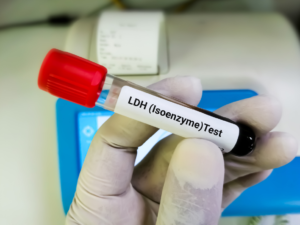What are tumor markers and what are they used for?
Tumor markers are substances (proteins in general) produced by cancer cells or produced naturally by the body in response to cancer or other benign conditions. In order to detect them, various types of patient samples (blood, urine, tissue or biological fluids) are required.
It should be mentioned that tumor markers are not diagnostic of cancer by themselves. They can provide additional information to be taken into account in the patient’s diagnosis. Thus, they are reviewed together with the patient’s clinical history, physical examination and other laboratory tests (imaging tests). Markers can be used for a variety of purposes: to aid prognosis, to diagnose, to monitor disease recurrences, to monitor response to treatment, or to screen the general population.
There are many types of markers due to the types of cancer involved. However, only a few are used in routine clinical practice. There may be some types that, because they are less sensitive and specific, are rarely requested, and others that are under study. Current advances are allowing the development of new types of molecular biology tests. In this case, alterations in the genetic material associated with certain types of early cancers are evaluated.
The markers can provide us with very useful information, but they have some limitations. Some of them are altered with benign conditions that are not related to cancerous processes. In this case, additional medical tests would not be necessary. Another limitation is that some of the markers do not react to only one type of cancer, but react to different variations. One of the disadvantages is precisely that not all types of cancer have an associated marker.
How are the results interpreted?
As we have explained, each tumor marker has a reference value that is considered normal in a healthy person. Therefore, each marker must be evaluated independently. All results reports are accompanied by reference values to make an assessment without difficulty.
Often, an elevated level of tumor markers can be indicative of cancer. However, these results must be interpreted by a qualified specialist. He or she must have at his or her disposal the complementary medical tests he or she considers necessary to be able to make a reliable diagnosis. From there, he/she will be able to establish a treatment. If there are suspicions of cancer on the part of the patient, it is necessary to specify it to the medical staff so that they can advise which markers to recommend for your case.
What does the CEA tumor marker measure?
CEA (carcinoembryonic antigen) is the protein in some tissues of the fetus when it is developing. The concentration in the blood when a baby is born, as well as in adults, is low. When it increases, one of the causes could be some type of cancer, so it can become a tumor marker.
CEA increases mainly in colon cancer. However, recent studies have shown that it is also a marker for other malignancies, such as stomach or pancreatic cancer. There may also be an increase in CEA in diseases such as cirrhosis, ulcerative colitis, ulcers, benign breast disorders, or inflammation, and even in healthy individuals.
We see CEA appearing in other situations related to cancerous processes. Therefore, it does not constitute irrefutable proof of the presence of cancer in a body, but it has to be taken into account anyway.





